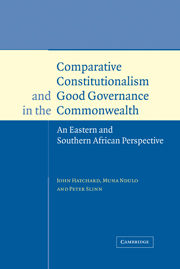 Comparative Constitutionalism and Good Governance in the Commonwealth
Comparative Constitutionalism and Good Governance in the Commonwealth Book contents
- Frontmatter
- Contents
- Preface
- List of cases
- List of constitutions
- List of statutes
- List of other instruments
- Map
- Introduction
- 1 The democratic state in Africa: setting the scene
- 2 Constitutions and the search for a viable political order
- 3 Devising popular and durable national constitutions: the new constitutions of the 1990s
- 4 Perfecting imperfections: amending a constitution
- 5 Presidentialism and restraints upon executive power
- 6 Enhancing access to the political system
- 7 Making legislatures effective
- 8 The judiciary and the protection of constitutional rights
- 9 The devolution of power to local communities
- 10 Developing autochthonous oversight bodies: human rights commissions and offices of the ombudsman
- 11 Seeking constitutional control of the military
- 12 Constitutionalism and emergency powers
- 13 Constitutional governance: the lessons from southern and eastern experience
- Bibliography
- Index
8 - The judiciary and the protection of constitutional rights
Published online by Cambridge University Press: 23 June 2009
- Frontmatter
- Contents
- Preface
- List of cases
- List of constitutions
- List of statutes
- List of other instruments
- Map
- Introduction
- 1 The democratic state in Africa: setting the scene
- 2 Constitutions and the search for a viable political order
- 3 Devising popular and durable national constitutions: the new constitutions of the 1990s
- 4 Perfecting imperfections: amending a constitution
- 5 Presidentialism and restraints upon executive power
- 6 Enhancing access to the political system
- 7 Making legislatures effective
- 8 The judiciary and the protection of constitutional rights
- 9 The devolution of power to local communities
- 10 Developing autochthonous oversight bodies: human rights commissions and offices of the ombudsman
- 11 Seeking constitutional control of the military
- 12 Constitutionalism and emergency powers
- 13 Constitutional governance: the lessons from southern and eastern experience
- Bibliography
- Index
Summary
Ordinary men and women need support in their fight to claim and protect their liberties. And their natural protectors are the courts.
The emergence of constitutions with wide-ranging and justiciable Bills of Rights has rekindled public awareness and interest in the role of courts through which to seek individual and collective justice and the sustenance of a democratic culture. The maintenance of an independent and accountable judiciary is fundamental to achieving such goals and these issues are discussed in the first part of the chapter. The second part considers the role of judges in undertaking their task as ‘guardians of the constitution’.
Judicial independence
Judicial independence is recognised in many international and regional human rights instruments and constitutes one of the Commonwealth's fundamental political values. The principle is also enshrined in all the ESA constitutions with the Ugandan Constitution encapsulating the point:
In the exercise of judicial power, the courts shall be independent and shall not be subject to the control or direction of any person or authority.
Whilst discussion often centres on protecting and promoting the rights of judges in the higher courts, we must also recognise that magistrates require comparable protection, not least because it is they who deal with the vast majority of cases, both criminal and civil, and it is upon them that much of the public confidence in the legal system resides.
The main pillars of judicial independence are institutional and financial autonomy.
- Type
- Chapter
- Information
- Comparative Constitutionalism and Good Governance in the CommonwealthAn Eastern and Southern African Perspective, pp. 150 - 183Publisher: Cambridge University PressPrint publication year: 2004
